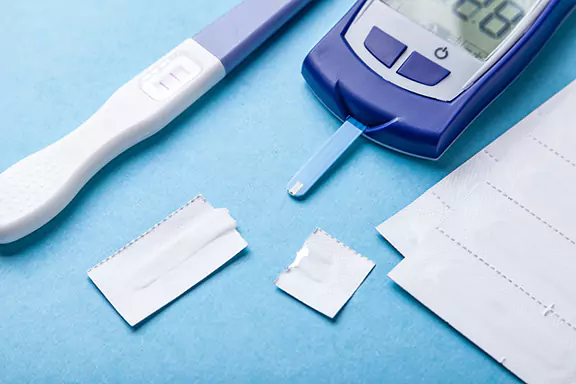The odds of developing diabetes tend to be higher among seniors. This is especially so if you have a family history of the disease or other risk factors such as high blood pressure.
If your medical profile contains some of these risk factors, you may be wondering about what your healthcare coverage is for diabetes-related screenings and treatment. This is a reasonable concern given the amount of special care and high treatment cost that people with diabetes face — the expense for insulin alone can add up very quickly.
The good news is that some of these cost are covered by government assistance programs such as Medicare. Medicare is set up by the Federal Government to ensure access to affordable medical insurance for people over the age of 65 or younger people with certain conditions. Below we will walk you through all that you need to know about a very important part of how a Medicare diabetes screening can help you prevent and manage the disease.
Who Should Consider Getting Diabetes Screening?
Before we get to Medicare diabetes screening coverage, screening, let’s first talk about who should consider getting diabetes screening. If any of the following risk factors apply to you, we recommend that you speak with your healthcare providers to discuss if you should get tested for the disease.
Weight: Being overweight or obese puts strain on your body’s ability to produce and use insulin.
Family history: The chances of developing diabetes is higher if your close relatives have diabetes.
Age: Your risk of diabetes increases with age, especially after 45.
High blood pressure or high cholesterol: These conditions can damage your blood vessels and increase diabetes risk.
Lack of exercise: Staying active helps control weight and uses up glucose, so a lack of physical activity raises diabetes risk.
Does Original Medicare Cover Diabetes Screening Tests?
Let’s now turn our focus to Medicare coverage for screenings and other expenses. Medicare Part B, the part of the Original Medicare that covers preventive services, will pay for screenings to check for diabetes or pre-diabetes, which may include the following:
Glucose screening tests
Medicare Part B covers multiple tests every year for high blood sugar, which is a sign of diabetes or prediabetes. People with risk factors such as high blood pressure, abnormal cholesterol levels, obesity, or a history of gestational diabetes, are recommended to take the tests.
Diabetes screening tests
If you have abnormal blood glucose screening test results, Medicare also covers blood tests to diagnose diabetes or prediabetes. These include the A1C test, fasting plasma glucose test, and oral glucose tolerance test.
Diabetes self-management training
If you are diagnosed with diabetes,
On the first year after you are diagnosed with diabetes, Medicare will cover up to 10 hours of training on managing the condition, and 2 hours per year after that. This training will include tips for meal planning, exercise, medications, monitoring blood sugar, and preventing further complications.
Certain diabetes supplies
Medicare covers types of equipment such as blood sugar monitors, test strips, lancets, and diabetes testing control solutions, as well as insulin pumps and infusion sets for insulin delivery.
Treatment
If you’re diagnosed, Medicare covers medications including insulin, as well as medical devices for treating severe diabetic foot disease or other complications.
Medicare also covers the below services to help monitor diabetes:
Annual diabetes screening tests
Diabetes self-management training to help you understand and manage your condition
Visits with your doctor for diabetes management
Diabetic supplies like blood sugar test strips, lancets, and glucometers
Insulin and certain oral medications
Foot exams and treatment for severe diabetic foot disease
Durable medical equipment like insulin pumps

How Often Does Medicare Cover Diabetes Screenings?
For people with risk factors, Medicare covers an initial diabetes screening at the time of enrollment in the program and at least every 3 years after that. If you are at risk, Medicare covers two diabetes screenings per year.
To prevent diabetes from progressing to more severe health issues like diabetic foot disease and kidney disease, early diagnosis of prediabetes is crucial. Once you’ve been diagnosed, Medicare covers diabetes self-management training from which you can learn skills to properly manage the condition, such as checking your own blood sugar levels, devising and following a meal plan, and engage in regular exercise.
Some diabetic supplies, such as glucose monitors, strips for testing, lancets, and control solutions, are covered by Medicare Part B, though there may be limits on how much or how often you get these supplies. On the other hand, insulin supplies are provided by Medicare drug plans (Part D). So if you don’t have Part B, you will have to pay the 100% cost for insulin equipment.
For people with severe diabetic foot disease, Medicare also covers certain durable medical equipment (DME) for diabetes management like insulin pumps, diabetic therapeutic shoes, inserts and modifications.
What Does Medicare Part D Cover for Diabetes?
Medicare Part D provides crucial coverage for individuals managing diabetes, specifically addressing the costs of insulin and related supplies. Here’s a detailed look at what you can expect from Part D coverage for diabetes care:
Insulin and Supplies
Medicare Part D covers various insulin types needed to control blood sugar levels, whether it’s injected using a syringe, pen, or pump. As of January 2023, there’s a cap on insulin copays, set at $35 per month per insulin product, with no deductible. This cap makes insulin more affordable for those on Medicare, ensuring that necessary diabetes management remains within reach.
In addition to insulin, Medicare Part D also covers medical supplies used to inject insulin. These supplies include:
Syringes: Essential for administering insulin injections.
Gauze: Used for cleaning the injection site and preventing infections.
Alcohol Swabs: Important for disinfecting the skin before injection.
To benefit from this coverage, you need a prescription from your doctor for both insulin and these related supplies.
Diabetes Medications
Medicare Part D plans also include coverage for various medications that are crucial in managing diabetes. These medications might include:
Oral hypoglycemics: Drugs that help lower blood sugar levels.
Non-insulin injectables: Such as GLP-1 receptor agonists, which assist in controlling blood sugar.
It’s important to note that coverage for specific medications can vary based on your Part D plan’s formulary. A formulary is a list of covered drugs, and it’s advisable to review this list to ensure your diabetes medications are included.
Do Medicare Advantage Plans Cover Diabetes Screenings?
Yes, Medicare Advantage plans, including Medicare Advantage Prescription Drug (MAPD) plans, cover diabetes screenings. These plans are required to offer at least the same coverage as Original Medicare, which includes a range of preventive services at no extra cost.
This means that diabetes screenings are covered without requiring you to pay a copayment, coinsurance, or deductible if you meet certain conditions, such as having high blood pressure, obesity, or a history of high blood sugar. Regular diabetes screenings help in early detection and management of diabetes, contributing to better overall health outcomes.

What a Medicare MAPD Plan Covers for Diabetes Medication and DME
Diabetes Medications
Medicare Advantage Prescription Drug plans provide comprehensive coverage for medications required to manage diabetes, including:
Insulin: MAPD plans cover various types of insulin, with costs capped at $35 per month per insulin product starting January 2023, with no deductible.
Oral Diabetes Medications: Common medications like metformin and sulfonylureas that help control blood sugar levels are typically covered.
Non-Insulin Injectable Medications: These include GLP-1 receptor agonists and other injectables that assist in diabetes management.
The out-of-pocket costs for these medications depend on your plan’s formulary, which categorizes drugs into different tiers with varying copayments or coinsurance.
Durable Medical Equipment (DME)
MAPD plans also cover a variety of durable medical equipment essential for diabetes management, such as:
Blood Glucose Monitors: Devices for measuring blood sugar levels.
Test Strips: Necessary for daily blood glucose testing.
Lancets and Lancing Devices: Used to obtain blood samples.
Continuous Glucose Monitors (CGMs): Provide real-time glucose readings.
Insulin Pumps: Devices that deliver continuous insulin.
Coverage for DME follows Medicare guidelines, requiring the equipment to be medically necessary and prescribed by your doctor. It must also be obtained from a Medicare-participating supplier that accepts your plan.
Additional Support and Benefits
Many MAPD plans offer extra benefits to support diabetes management, including:
Wellness Programs: Access to fitness programs, nutritional counseling, and diabetes education.
Telehealth Services: Virtual consultations with healthcare providers.
Preventive Services: Regular screenings and tests, like A1C tests.
Understanding Your Coverage
To maximize your benefits and minimize costs:
Review Your Plan’s Formulary: Ensure your diabetes medications are covered and understand cost-sharing details.
Check Network Providers: Use in-network DME suppliers and pharmacies.
Contact Your Plan: For detailed information on coverage rules, prior authorization, and resources for managing diabetes.
By understanding the comprehensive coverage offered by your Medicare MAPD plan, you can effectively manage diabetes with essential medications, durable medical equipment, and supportive services, ensuring better health and financial predictability.
What to Do if You Are Worried About Diabetes?
If you’re worried about having diabetes and the expenses that may come with it, the best way is to speak with a licensed insurance broker about finding a Medicare Plan that offers the most comprehensive coverage that fits your needs.
Get a personalized Health Insurance quote now.
Or dial toll free at 888-888-8380




